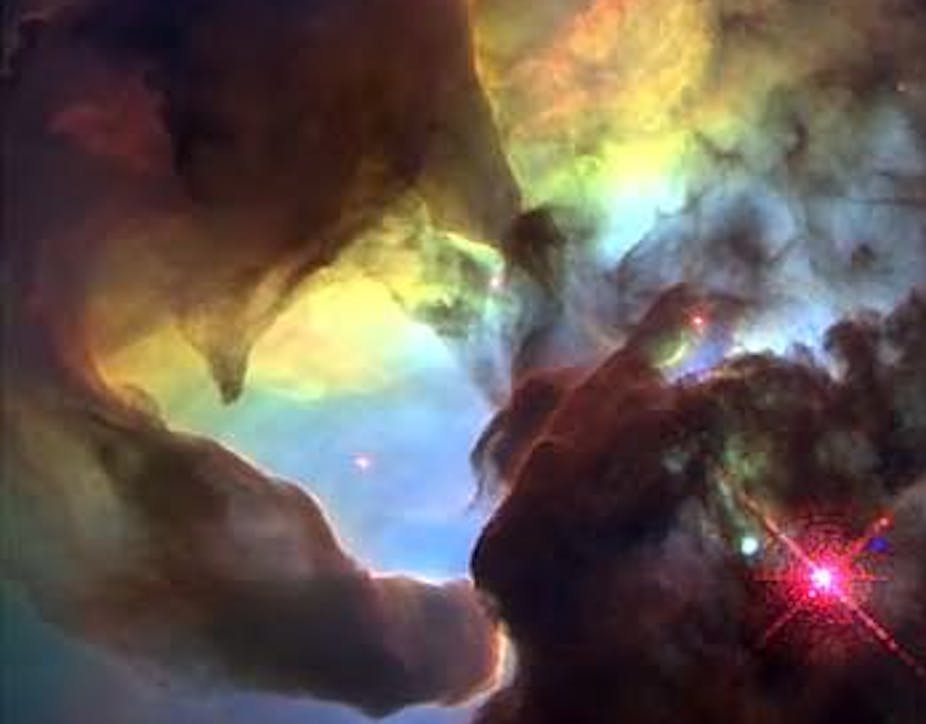Occasionally, very occasionally, a discovery comes along that reshapes our view of the universe.
Some discoveries teach us about ourselves; some teach us how to better interact with the world around us; some teach us how much we yet have to learn and, by revealing our ignorance, teach us humility.
The research that won this year’s Nobel Prize in physics falls into the last category.
As you’ll no doubt know by now, two teams of astrophysicists studying distant supernovae, discovered something very strange: the expansion of the universe is speeding up, contrary to everything we thought we knew about gravity.
The oddness of that discovery is profound.
It’s as though you threw a ball in the air expecting to catch it again in a moment, but instead watched in amazement as it accelerated off into space.

According to this finding, gravity appears to work backwards when looking at distant galaxies.
Hubble’s 1920’s discovery that galaxies existed beyond our own Milky Way reshaped our view of our place in the cosmos.
It vastly expanded the known universe and made us realise how small and how special we really are.
The subsequent discovery that those galaxies are moving away from us, and that the universe itself was expanding, was another jolt to the system. Scientific evidence that the universe actually had a beginning. Truly amazing.
No matter how profound both of those discoveries were, though, they could both still fit within our standard laws of physics.
In fact, realising the universe was expanding fixed a problem with Einstein’s theory of relativity, which actually predicts the universe must expand or contract because stars can’t just sit still with all that gravity around to pull things together.
Big questions
The 1998 discovery by our newest Nobel Laureates in Physics, that the universe is accelerating, seemingly does the opposite.
It breaks the laws of physics. The hole it leaves in our understanding of the cosmos has yet to be filled.
This has happened before. Newton’s theory of gravity works great for calculating the motion of a cricket ball or when building a bridge.
But at the turn of last century, there were observational hints that something about Newton’s theory was broken – the orbit of Mercury, for example, was not quite right.
Astronomers even postulated the existence of an extra undiscovered planet was disturbing Mercury’s orbit.
Then Einstein came along with a new theory of gravity and showed there was no extra planet, Newton’s theory just needed revision.
These days, Einstein’s theory of gravity is in everyday use, for example in the global positioning system (GPS) so many of us now use from our phones.
The discovery of the acceleration of the universe’s expansion has put us in a similar situation: something is not quite right.
Some postulate a “dark energy” is causing the acceleration; others claim we need a new theory of gravity.
As yet, we don’t know the answer. What is obvious is that the finding has opened the way for new knowledge, and shifted the entire direction of theoretical physics research.

Why do we care? Where might this knowledge take us?
We don’t yet know.
Discoveries are made on the fringe.
As researchers, we dance with ignorance and often spin into the unknown. Once in a while, someone finds a solid handhold and the rest of us clamber to catch on. These Nobel Prize winners have discovered a handhold, but we can’t yet understand the fundamental physics behind it.
That opens up a whole new world of possibility.
Using the dark side
The leading explanation is that the universe is brimming with some unknown stuff that has anti-gravity (let’s call it dark energy).
We hadn’t noticed it before because it doesn’t clump, so when you’re hanging out on a big clump of matter like the Earth, the effect of dark energy is dwarfed by the gravitational effect of normal matter.
If dark energy really is out there, then perhaps we can learn how to harness it.
Hover-boards? New propulsion systems? Floating cities? Cheap, clean energy?
Frivolous or fundamental, there’s no doubt the ability to manipulate gravity would drastically change our world, and technology as we know it.
There’s no indication yet that any such manipulation of dark energy is possible, so those applications are currently speculation.
But that’s one reason why these discoveries are of such import. It’s an exiting time for physics, and an exciting area to research, and I for one am happy to dedicate my days and nights to trying to figure out what the dark energy might be, and how to fix our understanding of gravity.

